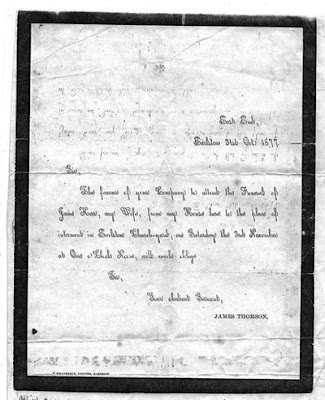THOMAS WEATHERLY (1833- 1891)
PRINTER, STATIONER, BOOKSELLER & POSTMASTER
For over 100 years the Weatherly Family was well known in Earlston as postmasters and postmistresses. This new blog series follows their lives from Thomas Weatherly born in 1833 in Berwick upon Tweed to his great grandson John P. Weatherly, remembered today my many local residents.
Thomas Weatherly was born in 1833 in Berwick upon Tweed, son of William Weatherly, a mariner and his wife Eleanor. Thomas married in 1855 in Berwick Sarah Patterson, whose surname was adopted by many of her descendants as a middle name.
The 1861 census saw the young family still in Berwick with Thomas 28, a printer, Sarah 36, and children Margaret 4 and baby John P. Ten years on in 1871 the family had grown with Margaret 14, John 10, Sarah 7 and Thomas 4 years old.
The family moved to Earlston, in the 1870s, with an advertisement in “The Southern Reporter” of 3rd September 1874 announcing that Thomas was opening a printing business in the village.
Slater’s Business Directory of 1878 listed Thomas Weatherly as one of five Booksellers & Stationers in the village, with Thomas described as a letter press printer and book binder. He was also listed under Fire & Office Agents as an insurance agent.
In 1881 the family was living on the High Street with Thomas at 48 years old described as a printer, his wife 58, daughters Maggie, aged 24 and 17 year old Sarah were both housekeepers; John at 20 was a bookseller’s assistant and 14 year old Thomas a printer’s apprentice – so very much a family business.
Thomas (senior) appeared also to act as agent for the local newspapers, with many adverts naming him as contact for information on property to let, events tickets and lost & found items, such as a lady’s fur muff lost at Earlston Fair, a lady’s riding crop, and a lady’s gold bracelet.Southern Reporter: 27th November 1879
A black edged letter printed by Thomas Weatherly as an invitation to a funeral.
We have a first-hand account of Thomas in Earlston, written by the Rev. William Crockett (1866-1945)
“A printer from Berwick, he migrated to the west of the shire (about 70 years ago) and had his stationer's and bookseller's shop on the High Street.
Weatherly's enterprise took him into the publishing and newspaper field, with an eight page weekly "The Border Beacon", followed by a second, having the rather high sounding title "The South of Scotland Live Stock Journal". I fancy that very few, if any copies, have survived, apart from those I have myself kept in file those many years.
As Weatherly discovered, Earlston was scarcely the place for a successful venture into the journalistic sphere”.
In 1883, Thomas Weatherly became Earlston Post Master, and the post office moved further along the High Street to what is now the Lucky Finds shop.
High Street , looking west, with the Weatherly shop & post office on the right.
Slater’s Business Directory
of 1886 noted the services offered by the Post Office under Thomas Weatherly.
Thomas served in the postmaster role until 1886, (the year his wife died), when his son John P. Weatherly succeeded him – to be followed by his granddaughters Margaret T. Weatherly and Ellen S. P. Weatherly and finally his great grandson John P. Weatherly, well known to many today for his involvement in village activities. .
Thomas died of bronchitis on 13th February 1891, aged 58. buried in Earlston Churchyard. The gravestone also marks the death of his wife Sarah in 1886 and his youngest, unmarried daughter Sarah in 1920.
***********
Daughter Margaret married in 1883 local man Adam Mauchlan, variously described as "fishmonger, poulterer, rabbit catcher, general dealer". Adam had his business on the High Street. The couple went on to have three sons and one daughter. interestingly in the 1901 Census their home was next door to the Weatherly family! Margaret died age 47 in 1904 and her husband described his 'beloved' wife as " a model wife and mother ever remembered by Adam Mauchlan". After Adam's death in 1910 the family moved away from the village, apart, from second son, Thomas, who worked as a power loom tuner and lived in Roosevelt Place, married twice but had no family of his own. He died at Rhymer's Cottages.
Earlston at the Turn of the Century

******************
Contributors: Susan Donaldson, Sheila McKay and Jeff Price of the Auld Earlston Group.
Sources:
- Birth, marriage and
death records, and census records on www.ancestry.co.uk and www.scotlandspeople.gov.uk
- Slater's Business Directories, 1878 and 1886.
- Earlston
Monumental Inscriptions, published by the Borders Family History Society.
- The Rhymer's Town: Further Notes on Earlston's Past, by Rev. Dr. W. S. Crockett. In "The Southern Annual”:1942.
*****************















